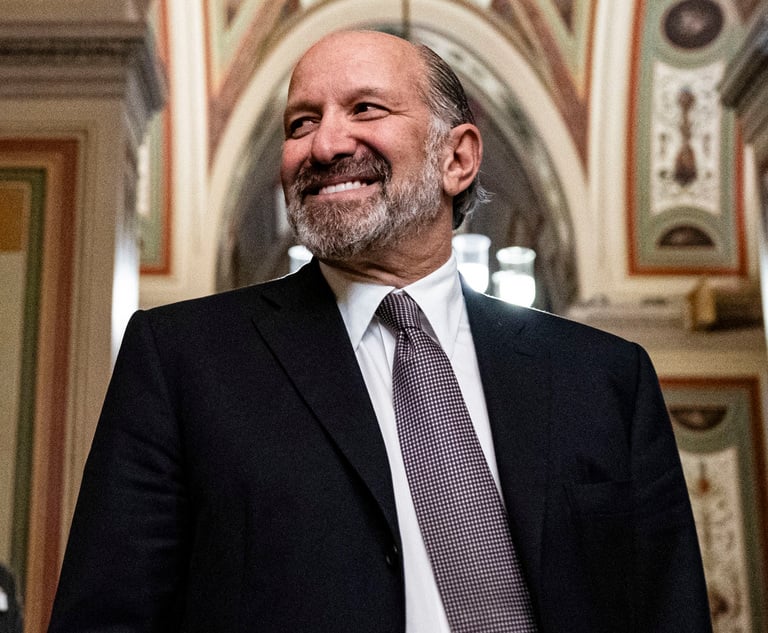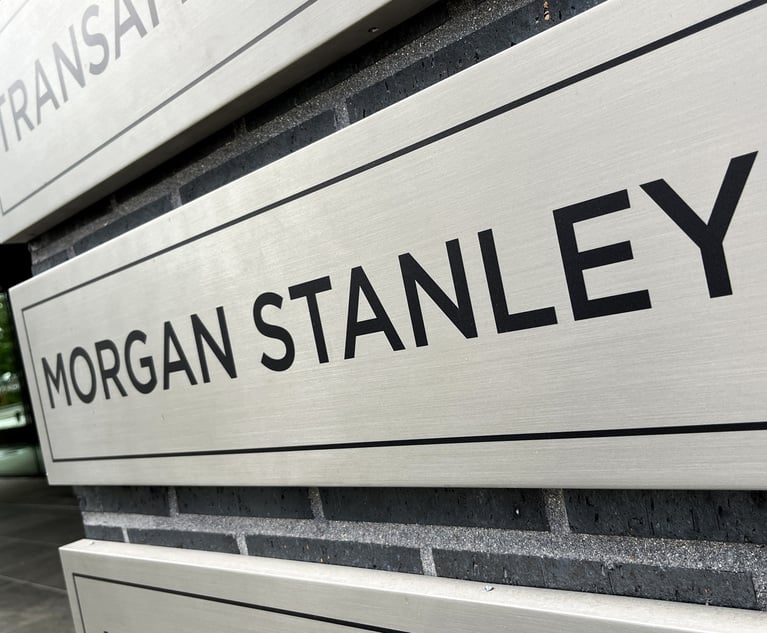 Former Wilmer Cutler Pickering Hale and Dorr partner Carl Nichols testifies at his confirmation hearing. Photo: Diego M. Radzinschi/ ALM
Former Wilmer Cutler Pickering Hale and Dorr partner Carl Nichols testifies at his confirmation hearing. Photo: Diego M. Radzinschi/ ALMNew DC Judge Urges 24-Hour Detente in Trump Tax Returns Case
Judge Carl Nichols, who joined the trial bench just a few weeks ago from Wilmer, faces what he called a "conundrum" in a dispute involving Trump's New York state taxes.
July 29, 2019 at 07:05 PM
5 minute read
The original version of this story was published on National Law Journal
In one of his first hearings on the federal bench, U.S. District Judge Carl Nichols of the District of Columbia has found himself in what he called a “conundrum.”
Nichols is wrestling with how to handle President Donald Trump's bid to prevent U.S. House Democrats from seeking his New York state tax returns.
On the one hand, the House Ways and Means Committee has not formally asked New York officials for those tax returns, raising a question of whether the case is even ripe for his consideration. On the other hand, Nichols noted at a hearing Monday in Washington, the House Ways and Means Committee could request the records and New York could provide them without notifying Trump, instantly rendering the case moot.
That state of play, he said, left him in a “very awkward position.” And Nichols, who was confirmed to the bench in May, blamed House Democrats and New York state officials for putting him there.
“No one has committed to me that there won't be a production tomorrow, or Monday, or the Monday after,” Nichols said.
Trump's suit takes aim at the “Trust Act,” a New York law adopted only weeks ago that would allow the U.S. House Ways and Means Committee to obtain Trump's state tax returns from New York state officials. Trump has fought any disclosure of his tax returns, despite telling voters in 2016 that he would “absolutely” provide his returns—as modern presidential candidates all have done.
The case is one of several in Washington and New York that confront the secrecy of Trump's financial records. Two federal appeals courts are weighing judges' orders that would permit House committees to obtain records from Trump's longtime accounting firm Mazars USA and from his longtime lender Deutsche Bank. Separately, the Ways and Means Committee is suing the Treasury Department and IRS to obtain Trump's federal tax returns.
After about 90 minutes of arguments Monday, Nichols effectively ordered a 24-hour detente, telling the sides to negotiate and report back by 6 p.m. Tuesday on whether they could agree on a process to ensure that any request for Trump's state tax returns could be litigated.
Nichols said he trusted that House Democrats would neither seek Trump's state tax returns—nor would New York provide them—during that stretch. But he stopped short of issuing a formal order preventing Democrats from taking that step.
House general counsel Douglas Letter argued Congress enjoys broad immunity that should block the president from being able to preemptively stop lawmakers from pursuing his tax returns.
Trump's personal lawyer, William Consovoy of the Washington litigation boutique Consovoy McCarthy, on Monday pitched Nichols on an order that would prevent New York from obliging any request for Trump's tax returns.
That proposal drew a rebuke from the office of New York Attorney General Letitia James. In a letter to Nichols, New York litigation counsel Andrew Amer said the state had been “blindsided” by Consovoy's request. “There is simply no excuse for plaintiff's eleventh-hour expansion of the relief he is seeking to include the New York [attorney general and state finance department],” Amer wrote.
Letter and Amer further questioned whether Nichols, or any federal judge in Washington, would have jurisdiction over New York.
Trump filed the case in Washington in an effort to attach it to a pending lawsuit in which the House is seeking copies of his federal tax returns. U.S. District Judge Trevor McFadden, appointed in 2017 to the trial court, is assigned to the House's case against the Treasury Department and IRS.
Nichols, confirmed in May by the U.S. Senate, formally joined the Washington federal trial bench last month from Wilmer Cutler Pickering Hale and Dorr, where he had been a partner. He was randomly assigned the Trump state tax returns case July 26 after McFadden said Trump's lawyers could not automatically put the case on his docket.
This content has been archived. It is available through our partners, LexisNexis® and Bloomberg Law.
To view this content, please continue to their sites.
Not a Lexis Subscriber?
Subscribe Now
Not a Bloomberg Law Subscriber?
Subscribe Now
NOT FOR REPRINT
© 2024 ALM Global, LLC, All Rights Reserved. Request academic re-use from www.copyright.com. All other uses, submit a request to [email protected]. For more information visit Asset & Logo Licensing.
You Might Like
View All
Trump Mulls Big Changes to Banking Regulation, Unsettling the Industry

SEC Issues $6.75M Fine Against Financial Firm Led by Trump's Choice to Lead Commerce Dept.
3 minute read
Trending Stories
Who Got The Work
Michael G. Bongiorno, Andrew Scott Dulberg and Elizabeth E. Driscoll from Wilmer Cutler Pickering Hale and Dorr have stepped in to represent Symbotic Inc., an A.I.-enabled technology platform that focuses on increasing supply chain efficiency, and other defendants in a pending shareholder derivative lawsuit. The case, filed Oct. 2 in Massachusetts District Court by the Brown Law Firm on behalf of Stephen Austen, accuses certain officers and directors of misleading investors in regard to Symbotic's potential for margin growth by failing to disclose that the company was not equipped to timely deploy its systems or manage expenses through project delays. The case, assigned to U.S. District Judge Nathaniel M. Gorton, is 1:24-cv-12522, Austen v. Cohen et al.
Who Got The Work
Edmund Polubinski and Marie Killmond of Davis Polk & Wardwell have entered appearances for data platform software development company MongoDB and other defendants in a pending shareholder derivative lawsuit. The action, filed Oct. 7 in New York Southern District Court by the Brown Law Firm, accuses the company's directors and/or officers of falsely expressing confidence in the company’s restructuring of its sales incentive plan and downplaying the severity of decreases in its upfront commitments. The case is 1:24-cv-07594, Roy v. Ittycheria et al.
Who Got The Work
Amy O. Bruchs and Kurt F. Ellison of Michael Best & Friedrich have entered appearances for Epic Systems Corp. in a pending employment discrimination lawsuit. The suit was filed Sept. 7 in Wisconsin Western District Court by Levine Eisberner LLC and Siri & Glimstad on behalf of a project manager who claims that he was wrongfully terminated after applying for a religious exemption to the defendant's COVID-19 vaccine mandate. The case, assigned to U.S. Magistrate Judge Anita Marie Boor, is 3:24-cv-00630, Secker, Nathan v. Epic Systems Corporation.
Who Got The Work
David X. Sullivan, Thomas J. Finn and Gregory A. Hall from McCarter & English have entered appearances for Sunrun Installation Services in a pending civil rights lawsuit. The complaint was filed Sept. 4 in Connecticut District Court by attorney Robert M. Berke on behalf of former employee George Edward Steins, who was arrested and charged with employing an unregistered home improvement salesperson. The complaint alleges that had Sunrun informed the Connecticut Department of Consumer Protection that the plaintiff's employment had ended in 2017 and that he no longer held Sunrun's home improvement contractor license, he would not have been hit with charges, which were dismissed in May 2024. The case, assigned to U.S. District Judge Jeffrey A. Meyer, is 3:24-cv-01423, Steins v. Sunrun, Inc. et al.
Who Got The Work
Greenberg Traurig shareholder Joshua L. Raskin has entered an appearance for boohoo.com UK Ltd. in a pending patent infringement lawsuit. The suit, filed Sept. 3 in Texas Eastern District Court by Rozier Hardt McDonough on behalf of Alto Dynamics, asserts five patents related to an online shopping platform. The case, assigned to U.S. District Judge Rodney Gilstrap, is 2:24-cv-00719, Alto Dynamics, LLC v. boohoo.com UK Limited.
Featured Firms
Law Offices of Gary Martin Hays & Associates, P.C.
(470) 294-1674
Law Offices of Mark E. Salomone
(857) 444-6468
Smith & Hassler
(713) 739-1250







